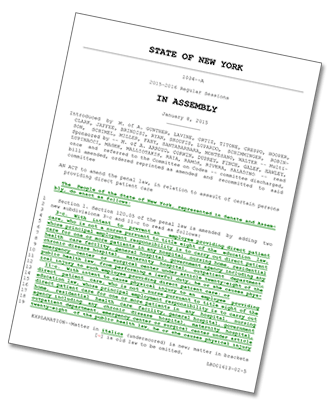Non-nurses providing direct patient care in various settings are now provided the same protection as nurses: Last month, it became a felony to assault these non-nurse health care providers under a new New York state law.
 The law will expand protections to many health care workers. According to the Bureau of Labor Statistics, health care workers in the U.S account for close to 70 percent of all nonfatal workplace assaults — and causing missed days of work.
The law will expand protections to many health care workers. According to the Bureau of Labor Statistics, health care workers in the U.S account for close to 70 percent of all nonfatal workplace assaults — and causing missed days of work.
"We have had members attacked and hurt in the past," said Barbara Lipsky, president of the local union representing 500-member health care members at Brookhaven Memorial Hospital. "There have been nurses and health care professionals/workers physically attacked and/or rendered unconscious."
Previous assault legislation protected health care professionals, ranging from registered nurses to firefighters and emergency medical technicians (EMTs). Under this new legislation, passed by the Assembly and Senate and signed by the governor, other health care workers, such as lab workers, pharmacists and respiratory therapists, will now be protected.
"This proposal is consistent with the current inclusion of nurses and will lead to greater protections for health care workers that have to deal with difficult conditions and patient -related issues day in and day out," reads the proposal for the bill, sponsored by Assemblywoman Aileen Gunther, D-Forestburgh, and supported by NYSUT.
"It is absolutely essential that each member of the health care team is provided a safe environment in which they work. The physical assault of any member of our health care team is a crime and intolerable," said Anne Goldman, chair of NYSUT's Health Care Professionals Council and a UFT vice president. "We must be sure that individuals who assault our staff will be held accountable for their wrongful behavior. To provide a therapeutic environment, we must have a safe place where respect and dignity is afforded to the patients we serve as well as to the staff who provides care."
Lipsky said that, just at Brookhaven alone, health care workers who will now be afforded more protection if assaulted include an alcoholism counselor, senior lab technologist, respiratory therapist, community educator, medical librarian, clinical dietician, lab technologist, social worker, psychiatric social worker, homecare social worker, senior lab technologist, physician assistant, pharmacist, clinical psychologist and care manager.
"Of course, we all strive to prevent such incidents but knowing that all health care individuals are afforded the same legal protection as nurses, helps all, not just a select group. That's what 'union' is all about," said Lipsky. "The passage of any legislation that helps any health care individual is a step in the right direction."
Violence prevention is vital to help reduce incidents and protect patient and staff. Training and incident reporting are essential to reduce harm.
The legislation is "valid as far as bringing justice for the victims after the particular incident but, of course, prior protection from harm would be best," Lipsky said.